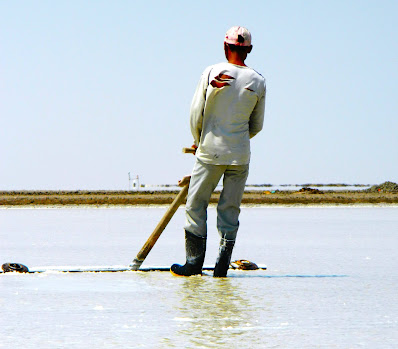Indian Express: Ahmedabad: Friday, 19 Jan 2024.
The court of Justice Vaibhavi Nanavati on Thursday issued a notice to the state authorities as well as the Patan district collector and sought a response from the respondent parties by January 29, when the court is due to take up the matter next.
The court of Justice Vaibhavi Nanavati on Thursday issued a notice to the state authorities as well as the Patan district collector and sought a response from the respondent parties by January 29, when the court is due to take up the matter next.
The petition has highlighted
that the salt cultivation season stretches from mid-September until April, and
they have been stopped from undertaking cultivation in plots less than 10 acres
in area.
The Gujarat High Court on Thursday issued a notice to the state government and its Department of Forest and Environment, and Labor and Employment Department, over a petition moved by 53 salt pan workers.
The petition has highlighted that the salt cultivation season stretches from mid-September until April, and they have been stopped from undertaking cultivation in plots less than 10 acres in area. The petitioners are seeking the court’s directions to the state authorities to be allowed to cultivate salt.
According to the petitioners, who are traditional agariyas (salt pan workers) hailing from Santalpur in Patan, they have been cultivating salt in the Santalpur region of Little Rann of Kutch in Patan. They were issued agariya pothi (document permitting them cultivation) in the year 2008, based on the recommendation of a High-Level Empowered Committee and its detailed survey of every land parcel used for the cultivation of salt in the Little Rann of Kutch, the court was told.
The petitioners are challenging the action of the state’s Department of Forest and Environment of not allowing their families to cultivate salt even as the department permitted about 3,800-odd ‘similarly situated’ traditional agariya families to cultivate salt in Kharagoda region, Dhangadhra region, Zinjuvada region, Halwad region and Maliya region of Little Rann of Kutch.
The petitioners, represented by advocate Anand Yagnik, have submitted that the Forest Department’s action of not permitting the petitioners to cultivate salt has been reasoned on the ground that the area of cultivation is situated within the Wild Ass Sanctuary marked under the Wildlife Protection Act, 1972 in the Little Rann of Kutch. However, the petitioners have pointed out that the other five regions where about 3,800 traditional agariya families have been permitted to cultivate salt “is also an integral part of the Wild Ass Sanctuary”.
The court of Justice Vaibhavi Nanavati on Thursday issued a notice to the state authorities as well as the Patan district collector and sought a response from the respondent parties by January 29, when the court is due to take up the matter next.
Traditional agariyas do not require a license or lease to cultivate up to 10 acres of land for the production of salt by recommendation of the Salt Expert Committee constituted by the Government of India after Independence in the year 1948.
According to the petitioners, in a communication dated May 24, 2023, by the Principal Chief Conservator of Forest (Wildlife), addressing the Deputy Conservator of Forest, Wild Ass Sanctuary, Dhangadra, it was stated that “to prevent unauthorised salt pans producing salt and related activities, only those persons to whom the Agar Card will be issued, can enter in the Wild Ass Sanctuary in the Little Rann of Kutch to produce salt.”
The Gujarat High Court on Thursday issued a notice to the state government and its Department of Forest and Environment, and Labor and Employment Department, over a petition moved by 53 salt pan workers.
The petition has highlighted that the salt cultivation season stretches from mid-September until April, and they have been stopped from undertaking cultivation in plots less than 10 acres in area. The petitioners are seeking the court’s directions to the state authorities to be allowed to cultivate salt.
According to the petitioners, who are traditional agariyas (salt pan workers) hailing from Santalpur in Patan, they have been cultivating salt in the Santalpur region of Little Rann of Kutch in Patan. They were issued agariya pothi (document permitting them cultivation) in the year 2008, based on the recommendation of a High-Level Empowered Committee and its detailed survey of every land parcel used for the cultivation of salt in the Little Rann of Kutch, the court was told.
The petitioners are challenging the action of the state’s Department of Forest and Environment of not allowing their families to cultivate salt even as the department permitted about 3,800-odd ‘similarly situated’ traditional agariya families to cultivate salt in Kharagoda region, Dhangadhra region, Zinjuvada region, Halwad region and Maliya region of Little Rann of Kutch.
The petitioners, represented by advocate Anand Yagnik, have submitted that the Forest Department’s action of not permitting the petitioners to cultivate salt has been reasoned on the ground that the area of cultivation is situated within the Wild Ass Sanctuary marked under the Wildlife Protection Act, 1972 in the Little Rann of Kutch. However, the petitioners have pointed out that the other five regions where about 3,800 traditional agariya families have been permitted to cultivate salt “is also an integral part of the Wild Ass Sanctuary”.
The court of Justice Vaibhavi Nanavati on Thursday issued a notice to the state authorities as well as the Patan district collector and sought a response from the respondent parties by January 29, when the court is due to take up the matter next.
Traditional agariyas do not require a license or lease to cultivate up to 10 acres of land for the production of salt by recommendation of the Salt Expert Committee constituted by the Government of India after Independence in the year 1948.
According to the petitioners, in a communication dated May 24, 2023, by the Principal Chief Conservator of Forest (Wildlife), addressing the Deputy Conservator of Forest, Wild Ass Sanctuary, Dhangadra, it was stated that “to prevent unauthorised salt pans producing salt and related activities, only those persons to whom the Agar Card will be issued, can enter in the Wild Ass Sanctuary in the Little Rann of Kutch to produce salt.”

















.jpg)
.jpg)
.jpg)
.jpg)













No comments:
Post a Comment